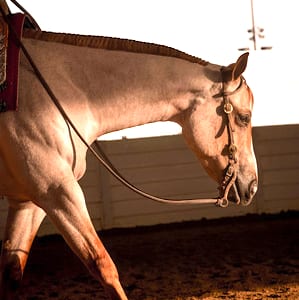Quarter Horses and Paints alike are defined as versatile horses by their own associations. But do true all-around horses still exist in this age of specialization? Find out what some of today’s top trainers had to say about the modern all-around horse.
Standing around at the arena of any given breed show, you might hear people reminiscing about what multi-event horses used to be, and perhaps even some concerns about today’s one-event horses and their impact on the industry.
But has specialization really changed our sport that much? “Everything in our lives has gotten specialized if you think about it,” quips Jimmy Becker, renowned AQHA All-Around Trainer. “The whole world has gotten that way, so it’s natural for our horses to have changed, too.”
While changes in our breeds have affected the way all-around horses show, it hasn’t stopped today’s successful trainers from applying their principles and experience to create a new type of champion.
The New All-Around Athlete
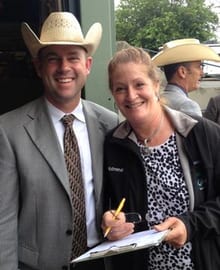
“I do think the definition of the all-around horse has changed,” says Trainer Chad Evans (pictured left), an AQHA Professional Horseman and Judge. “It used to be a horse that could do ten or 11 events including the over fence and all the flat classes; now that is no longer necessarily realistic at a national quality level.”
Because of the transformation, the desire to compete on an all-around horse often comes down to making some choices. “What you really need now is a horse that excels in say three events verses ten because the competition is so deep in every class,” adds Becker.
Multiple World Champion APHA Trainer, Karen Qualls, agrees, “Back in the day, there were no specialized horses, and now there are some one-event horses. I feel all-around horses still exist, but there are two types: the all-around that can compete in western pleasure but not the hunt seat, and vice versa. Some horses can be top five in the hunt seat and still do the all-around, but it’s not a horse we’re going to enter in the western pleasure. But I just don’t feel like you can truly do the all-around and do both–-you have you to pick your type of horse: more western, or more hunter-based.”
Defining the Modern All-Arounder
When it comes to what professionals look for, movement of this modern athlete is just one key element in each trainer’s definition.
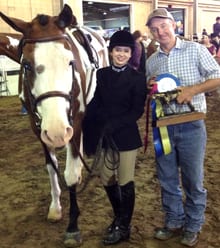
For APHA World Champion Trainer, Tim Wildes (pictured right), movement is crucial when combined with athletic capability and mindset. “My definition is a horse that probably has more ability than the average horse mentally and physically. They just have to be good movers and you have to start with a pretty athletic animal, with an exceptionally good mind. They’re a little smarter, a little more trainable, and have to be able to pick up their feet for the trail. All-around horses like going to horse shows and they like their jobs. When the going gets tough, you have to have a lot of heart to be an all-around horse.”
Similar factors are part of Karen Qualls’ evaluation of all-around prospects. “I just bought a new three year-old and he’s hunt seat based; that’s all he’s been shown in, and he can jog, so he’ll do the horsemanship. He lopes really well, so I think he’ll change leads, and he’s smart, so I think he’ll learn equitation and showmanship. I took him over some poles, and I think he’ll have an aptitude for the trail. So I’m considering him an all-around prospect since it takes time to put all those events on them; in order to do that, I also like them to have good attitudes.”
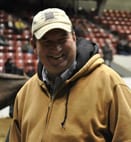
Jimmy Becker (pictured left) stresses the importance of the mind of his horses, too. “I think the first and most important thing is that the horse has the temperament to do it – you can have a great mover, and all the ability in the world, but that’s secondary because you have to be able to depend on the horse. I can tell by the way they’re able to take the training, and I’ll always go with the horse that’s able to learn better.”
Both movement and mind are also key for Chad Evans, who finds that good movers tend to stay fresh to classes longer. “I love a horse that is a great mover and has a great brain; I think all-around horses have to be inherently good movers, as it’s definitely easier for them because it’s not so physically taxing. If a horse is a naturally gifted mover, it’s easier to introduce them to lead changes and other events. It’s harder on a horse that has average talent,” explains Evans.
According to Evans, for the AQHA All-Around horse, getting performance halter points is now crucial to the all-around title, so correctness can influence their success as well.
Keeping Things in Perspective
While the trailer race for an all-around title is sometimes controversial, successful trainers maintain perspective and consider the mental and physical soundness of the equine athlete first.
The practice of showing in halter class for points ties into the core philosophy practiced by Becker and his clients to promote longevity of their horses. “I do think the halter part is important for the all-around horse, because if they’re not structurally correct, how can they be an all-around horse and hold up?” agrees Becker. “We go through a pretty extensive vet check when we buy them.”
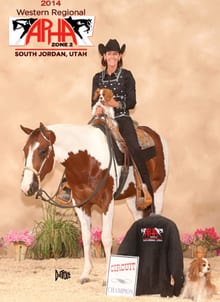
He attributes some of his accomplishments to experience and time, learning to keep his horses sound and bringing them along slowly. “I think the race can go too far, because you have to have a horse left when you’re done hauling for the all-around. In today’s world, people often want instant gratification, but you’ll find a lot of your good all-around horses that have lasted with experienced trainers who have taken their time with them. I have a champion all-around horse in the barn that’s 14, and now a little girl is showing her, and she’ still winning the all-around.”
For Wildes, remembering that a horse has to be happy to do his job is an overriding factor. “An all-around horse has to handle the hauling, and the long days. It takes time to add events and can be up to five years to train them for all the events, and you have to remember they have limits. Not over prepping and expecting a win from every class – even though an all-around horse has the capability of winning every class – is important. We get them 85% ready and have them go in the ring and be happy.
In Qualls’ barn (Karen Qualls pictured right), their focus is on happy and fit horses first, and not the lure of the titles. “We don’t really run for the all-around,” explains Karen. “The way the Paint-O-Ramas are structured, we never have more than two to three classes a day. And we show our normal events, and if we win it in our seven events, we win – I never add events that a horse isn’t ready for just to win a title-never.”
“It’s not such a trailer race to win now,” tells Evans. “It’s not such a coveted title anymore. The way we approach it – if you’re having a good horse show in your normal classes, you might add an event or two, but always keeping the big picture of the quality of the performance and the soundness of the horse, both mentally and physically, in mind.”
Without a doubt, the environment surrounding show horses is beginning to change, maybe in part due to the transformation in our all-around horses themselves. The specialization of our breeds could just be having a positive influence that no one expected: a renewed focus on the health, happiness, and quality of the still-thriving all-around horse.
Photo © Don Trout Photography
About the author: Delores Kuhlwein, a freelance equine writer, shows and breeds American Paint Horses and American Quarter Horses together with her husband, Mark, in Glendale, Arizona. Delores began sharing her lifetime love of horses through writing in 2011 after retiring from 15 years as an educator. In addition to being active with her local regional Paint Horse club and the American Paint Horse Association, she manages two family-owned businesses. Her favorite activities are showing her beloved mare in amateur events, and traveling with her husband and two dogs.
 “I do think the definition of the all-around horse has changed,” says Trainer Chad Evans (pictured left), an AQHA Professional Horseman and Judge. “It used to be a horse that could do ten or 11 events including the over fence and all the flat classes; now that is no longer necessarily realistic at a national quality level.”
“I do think the definition of the all-around horse has changed,” says Trainer Chad Evans (pictured left), an AQHA Professional Horseman and Judge. “It used to be a horse that could do ten or 11 events including the over fence and all the flat classes; now that is no longer necessarily realistic at a national quality level.” For APHA World Champion Trainer, Tim Wildes (pictured right), movement is crucial when combined with athletic capability and mindset. “My definition is a horse that probably has more ability than the average horse mentally and physically. They just have to be good movers and you have to start with a pretty athletic animal, with an exceptionally good mind. They’re a little smarter, a little more trainable, and have to be able to pick up their feet for the trail. All-around horses like going to horse shows and they like their jobs. When the going gets tough, you have to have a lot of heart to be an all-around horse.”
For APHA World Champion Trainer, Tim Wildes (pictured right), movement is crucial when combined with athletic capability and mindset. “My definition is a horse that probably has more ability than the average horse mentally and physically. They just have to be good movers and you have to start with a pretty athletic animal, with an exceptionally good mind. They’re a little smarter, a little more trainable, and have to be able to pick up their feet for the trail. All-around horses like going to horse shows and they like their jobs. When the going gets tough, you have to have a lot of heart to be an all-around horse.”
 Jimmy Becker (pictured left) stresses the importance of the mind of his horses, too. “I think the first and most important thing is that the horse has the temperament to do it – you can have a great mover, and all the ability in the world, but that’s secondary because you have to be able to depend on the horse. I can tell by the way they’re able to take the training, and I’ll always go with the horse that’s able to learn better.”
Jimmy Becker (pictured left) stresses the importance of the mind of his horses, too. “I think the first and most important thing is that the horse has the temperament to do it – you can have a great mover, and all the ability in the world, but that’s secondary because you have to be able to depend on the horse. I can tell by the way they’re able to take the training, and I’ll always go with the horse that’s able to learn better.”
 He attributes some of his accomplishments to experience and time, learning to keep his horses sound and bringing them along slowly. “I think the race can go too far, because you have to have a horse left when you’re done hauling for the all-around. In today’s world, people often want instant gratification, but you’ll find a lot of your good all-around horses that have lasted with experienced trainers who have taken their time with them. I have a champion all-around horse in the barn that’s 14, and now a little girl is showing her, and she’ still winning the all-around.”
He attributes some of his accomplishments to experience and time, learning to keep his horses sound and bringing them along slowly. “I think the race can go too far, because you have to have a horse left when you’re done hauling for the all-around. In today’s world, people often want instant gratification, but you’ll find a lot of your good all-around horses that have lasted with experienced trainers who have taken their time with them. I have a champion all-around horse in the barn that’s 14, and now a little girl is showing her, and she’ still winning the all-around.”


